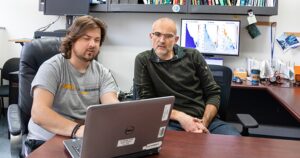UWM’s award-winning undergraduate research program encourages and highlights the work of students all over campus. Every year a number of these researchers are chosen to receive the Senior Excellence in Research Award.
The 2021-2022 winners were honored at an in-person event in Mitchell Hall 195 in May. Each student had the opportunity to share outcomes of the research projects and creative activity they worked on over this academic year, as well as to share what they have learned overall from their undergraduate research journeys.
In addition to being active in research, the awardees met monthly to discuss their progress and encourage others to take part in undergraduate research through class visits, presentations and media interviews.
Winners included Meghan Berger and Mary Widener in the Peck School of the Arts; Sanya Kathuria from the College of Health Sciences; and Jessie Van Dyck from the School of Architecture and Urban Planning.
The final winner hails from the College of Letters & Science. Nathan Tennies has combined his interests in mathematics and biological sciences in his research. Tennies, who works in the lab of Filipe Alberto, associate professor of biological sciences, is developing a web app to track and analyze data about how temperature fluctuations affect giant kelp off the central and south California coast. These kelp provide a key ecological habitat for aquatic life in the area. Using his mathematics skills, Tennies is developing ways of displaying markers, for example, that might indicate where previous research has been done with a link to the results. He’s hopeful that other undergraduate researchers will continue adding to the project’s findings.
Tennies said he’s been interested in biology since he was a child. His mom likes gardening and his dad has a small farm and he had a lot of exposure to nature through 4-H and the Boy Scouts. At UWM, he started working in the Janssen Lab at Freshwater Sciences, which led to his interest in aquatic plants. “Filipe’s lab was the next logical step since he’s the only aquatic botanist on campus.” After adding a mathematics major, he started doing modeling of data about aquatic plants. Working in Alberto’s lab has given him a way to explore this with his interest in aquatic botany.
This spring he also worked on a field research project in the Yucatan Peninsula. The goal of the project is to develop a metric for understanding the dwarf mangroves around Laguna Bacalar. He is working with Heidi Jeter of the School of Freshwater Sciences on two articles about that research.
He wanted to do undergraduate research as preparation for a future academic career.
“I have a whole research mindset now; I have a pretty decent understanding of what it’s like to work in labs and know that I really like it. Through the research, I’ve received opportunities to present at conferences, including one on the interface of biology and mathematics.”
In addition to other conferences, he will be presenting on his web app this summer at the annual meeting of the Society for Industrial and Applied Mathematics. “It should be a great opportunity to network and learn, with some of the conference subthemes being Life Sciences and Mathematics of the Planet Earth.”
